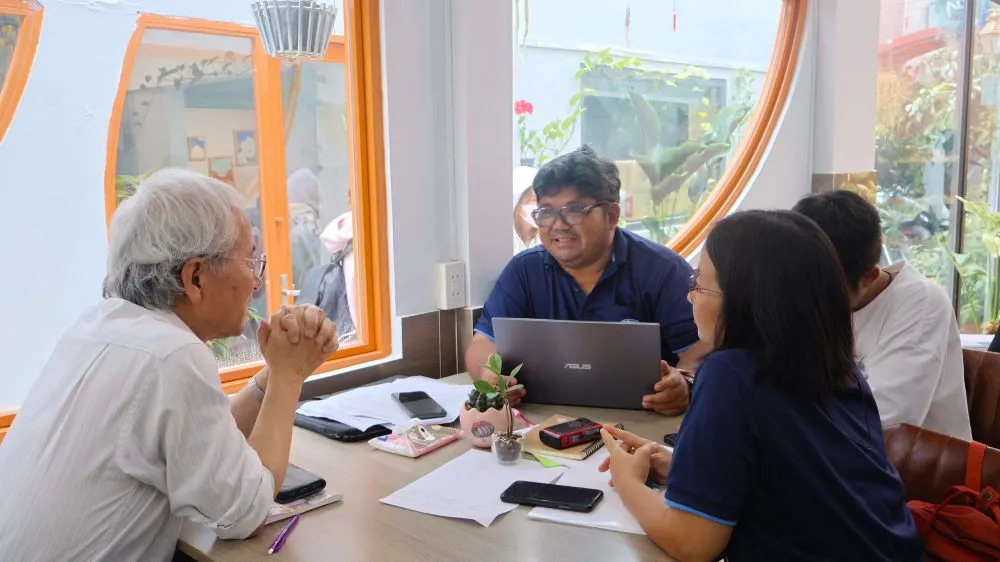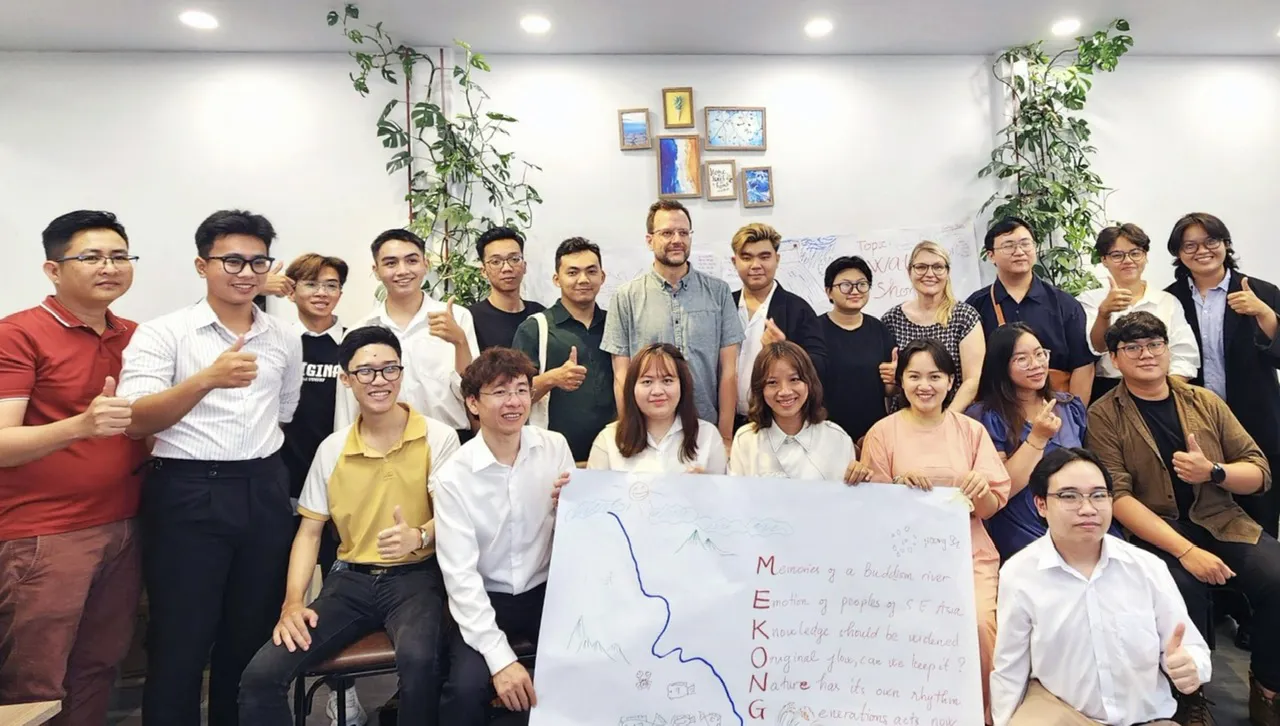In Vietnam: Young citizens rise as change agents to meet the nation’s environmental sustainability needs
Vietnam’s escalating environmental challenges, particularly climate change, have spurred the nation’s youth to actively seek solutions to environmental injustice and unsustainable practices.
Vietnam’s escalating environmental challenges, particularly climate change, have spurred the nation’s youth to actively seek solutions to environmental injustice and unsustainable practices.
| Dr. Nguyen Minh Quang (standing left), Lecturer at Can Tho University and Co-founder of the Mekong Environment Forum (MEF), and Brian Eyler, Director of Stimson Center's Southeast Asia Program and Energy, Water, and Sustainability Program at “Mekong Citizen Science Fair” in Can Tho City on March 23 2024. Photos: MEF |
Environmental pressures have increased levels of uncertainty about their future. As the effects of climate change and other environmental stressors intensify over time, one thing has become certain: today’s young people are both victims of environmental crises and agents of change.
According to the General Statistics Office of Vietnam (2023), Vietnam is home to about 18 million well-educated young people between the ages of 18 and 35 — the largest generation of youth in the country’s history. As Vietnam will be entering into the “aging population era” in a decade or so, this young generation is said to become the key contributor to environmental action.
With the country’s long, densely populated coastline threatened by typhoons, floods, droughts, and landslides and as one of the world’s fastest-growing per-capita greenhouse gas emitters, with emissions increasing fivefold in the last 20 years, it’s no wonder young people are eager to address the environmental crisis. Many university students and young professionals’ mobilization and adaptation initiatives show their commitment, desire, and ability to engage in environmental actions and to hold decision-makers accountable. Their message is clear: they are agents of change, entrepreneurs, and innovators, and it is the young people who, whether through education, science, or technology, will be scaling up their efforts and using their expertise to build on the previous generations’ achievements and accelerate environmental action.
As stated in the Decree on Grassroots Democracy, the Government of Vietnam encourages and is in need of ‘constructive voices’ from non-state actors, especially young professionals. This raises a question as to how young experts and citizen scientists can peacefully and effectively get their concerns heard and advocate for transparent and science-based decision-making processes in the local and national decision-making arenas.
| Brian Eyler and Dr. Nguyen Minh Quang, PhD researcher at ISS Erasmus University Rotterdam, chair the workshop. |
Across Vietnam, young practitioners frequently employ multiple strategies to cope with environmental stressors. Some young innovative farmers rely on government support through adaptation policies while many others expand their networks with academic and economic partners such as NGOs, think tanks, and export-processing companies to broaden their adaptation options. In many rural communes, particularly in the Mekong Delta, self-help adaptation strategies have proved successful and have the potential to be scaled up. Some of those innovative, often young, farmers and many students and young professionals are also active in policy and science platforms, where their voices and concerns are recognized by scientists, policymakers, foreign development partners, and private sectors, to name but a few.
| The Mekong Citizen Science Fair gathers prominent attendees. |
Empowering youth for collective impact
Vietnamese youth are actively contributing to combating climate change and environmental insecurity through innovation, sustainable practices, advocacy, and community involvement. Their initiatives drive real impacts on the ground and show that they are serious about paying in full ― with their very futures. The following two case studies illustrate two approaches to fostering youth engagement in environmental action.
| Regional scholars contribute to MEF's "Research Collaboration for Change" workshop held in Can Tho City on March 29-30. From left: Prof. Tuantong Jutagate, Ubon Ratchathani University; Dr. Apisom Intralawan, Mae Fah Luang University; Ms. Pornpinun Yeerong, Mae Fah Luang University; and Ms. Jutarat Rattanakaran, Mae Fah Luang University. |
Citizen science for sustainability
Over the past six years, the Mekong Environment Forum (MEF), a domestic NGO based in Can Tho City, has brought young student volunteers together in workshops that better equip them to be citizen scientists in the collection of water quality data and in their on-going outreach with rural or provincial level women’s organizations. This basis of civic science is fast becoming a valuable tool for the provincial government to reframe some of its policy directives.
This form of participatory commune-level civic scientific action succeeds in aligning with the State’s 2022 Law on the Implementation of Grassroots Democracy, which is the first of its kind in Vietnam.
| Dr. Nguyen Minh Quang and Thai scholars from Mae Fah Luang University. |
Recent training programs through the citizen science approach co-hosted by MEF and its partners have facilitated a collective framework and provided opportunities and channels for effective communication of the science, data, and policy issues. MEF’s series of citizen science workshops were designed to improve environmental literacy among university students and build science-based reporting capacity through the citizen science approach. Local experts, students, and non-state stakeholders can act as “agencies of change”. The citizen science approach has been employed in MEF’s training programs to promote two critical dimensions of agency: (i) the power of environmental communication and (ii) the co-production of knowledge. Over the last 5 years, MEF has trained over 380 citizen scientists, who are innovative farmers and women, local conservation practitioners, students and early-career researchers, and environmental journalists. While many of them are based in South Vietnam, some are from NGOs in Cambodia and Thailand.
| Dr. Nguyen Minh Quang and Prof. Mikio Oishi, Khon Kaen University International College, at the workshop in Can Tho. |
Mainstreaming youth in policy discourses
The Vietnamese youth are at the forefront of building a sustainable future through interactive and constructive policy dialogues. Youth-led initiatives in Vietnam, including citizen science programs on zero plastics, water monitoring, and marine biodiversity restoration, highlight innovative approaches to tackling environmental problems and fostering sustainable development. Youth participation in multi-stakeholder dialogues is said to result in important wins in the fight against environmental challenges and other non-traditional security issues. One excellent example is the series of Policy Dialogues co-hosted by Stimson Center and IUCN in the Lower Mekong countries.
| A Stimson-sponsored dialogue highlights youth-led initiatives. |
The annual Dialogues were originally designed to include an additional series of side events featuring on-the-ground engagement with rising scholars and students in the host country alongside each of the core dialogues to expand on the in-person workshops. When the eighth Policy Dialogue was hosted in Ho Chi Minh City in March 2024, it gave Vietnamese youth a platform to engage with policymakers by providing a follow-on engagement to share key takeaways from the Policy Dialogue with students, young professionals, and other stakeholders in Can Tho City. This hybrid meeting with the Mekong Environment Forum and staffers from Can Tho University on March 23, included in-person attendance from seventeen students and local community members. Dialogue participants also offered an overview of the Mekong-US Partnership, examined the United States' engagement in food security issues, and conducted an interactive exercise to develop multi-media presentations on how they value the Mekong Delta.
| Dr. Chaiwut GRUDPAN, Ubon Ratchathani University (C) at the workshop. |
Policy implications
Empowering youth to be effective and committed environmental practitioners is essential for forging a collective impact and solving urgent environmental and climate change crises. It is critical to give young practitioners the necessary leadership skills, strategic knowledge, and advocacy methods. Governments, organizations, and related platforms should develop training efforts and mentorship programs where senior experts and scientists guide and train youth in their science-driven advocacy journey, which, as a result, can enhance their influence on environmental action.
Youth should be given the opportunities to engage with decision-makers and should be acknowledged as important co-partners in resolving environmental issues. Governments, think tanks, and foreign development partners should enable young practitioners to take part in conferences and forums where climate-related decisions are made. Giving young people a seat at the table keeps them informed about decisions that affect their future while allowing their thoughts and ideas to broaden policy options.
| Participants at the “Mekong Citizen Science Fair”. |
In Vietnam, the government should track and identify climate-smart holistic solutions and work with (young) farmer scientists to scale them up. Currently, the uptake of youth-driven climate-smart agriculture is slow as young farmers lack technical support and are uncertain about the market value of alternative products. The government should work with start-ups through public-private partnerships to support pilot projects of existing initiatives and coordinate data collection to identify the most promising technologies for specific localities.
Research and academic institutions should actively work with the active pool of young citizen scientists to translate or interpret highly technical or complicated data into local language and actionable information accessible to local stakeholders, especially farmers, and authorities. Scientists and international development partners should train local community leaders, NGOs, and non-state networks on how to translate awareness into action. They can do so by supporting technical and communications skills-building among youth and local stakeholders.
For now, the tectonic shift needed is for policymakers to understand that the youth are not only connected to their land and water, but they also know that their very future depends on how fast resilience solutions come online.
James Borton, Co-founder of the Mekong Environment Forum (MEF) and Editor of the Mekong Dispatch newsletter, a news aggregator for the region.
Kieu Thoan Thu, Editor of The Hanoi Times



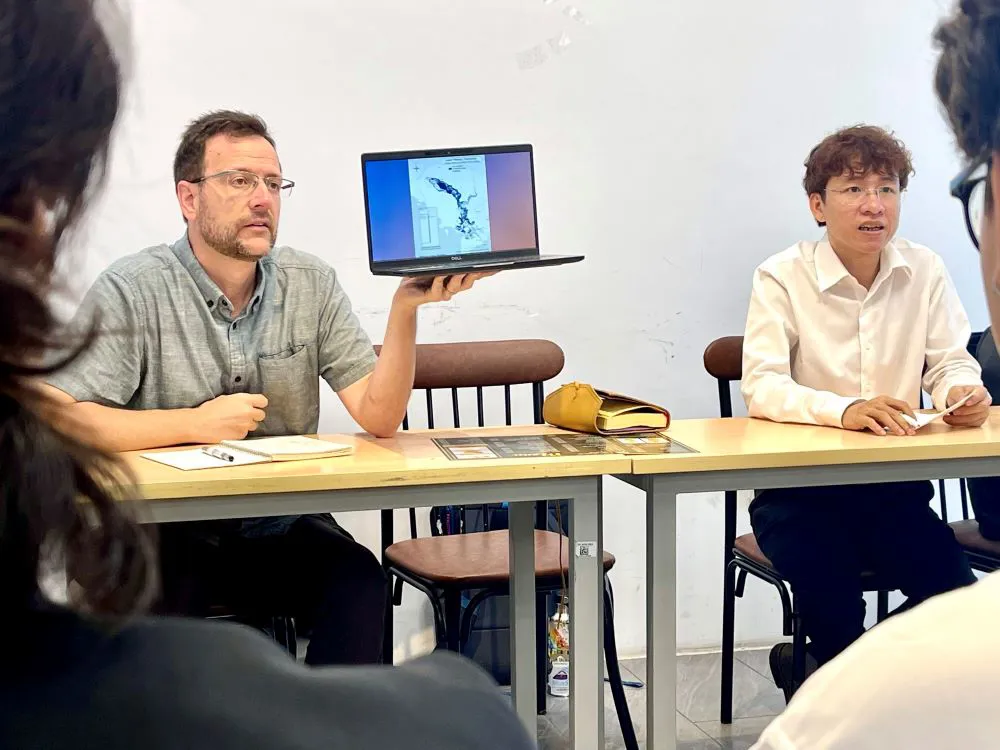
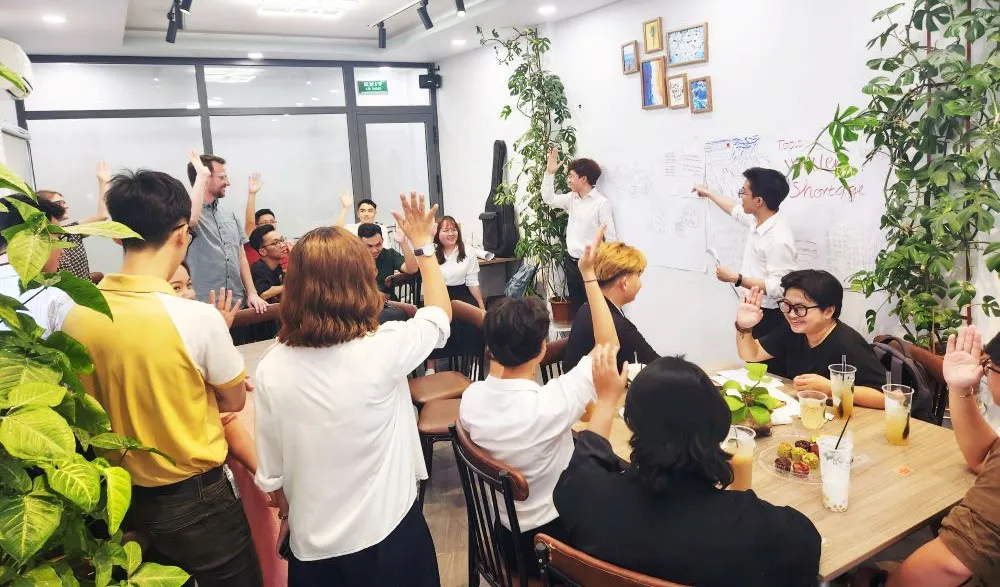
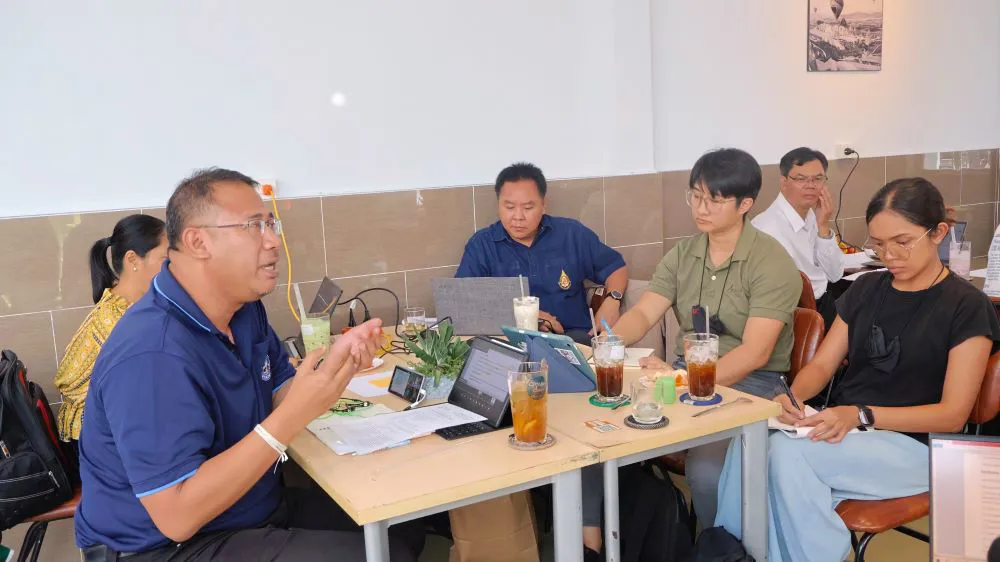
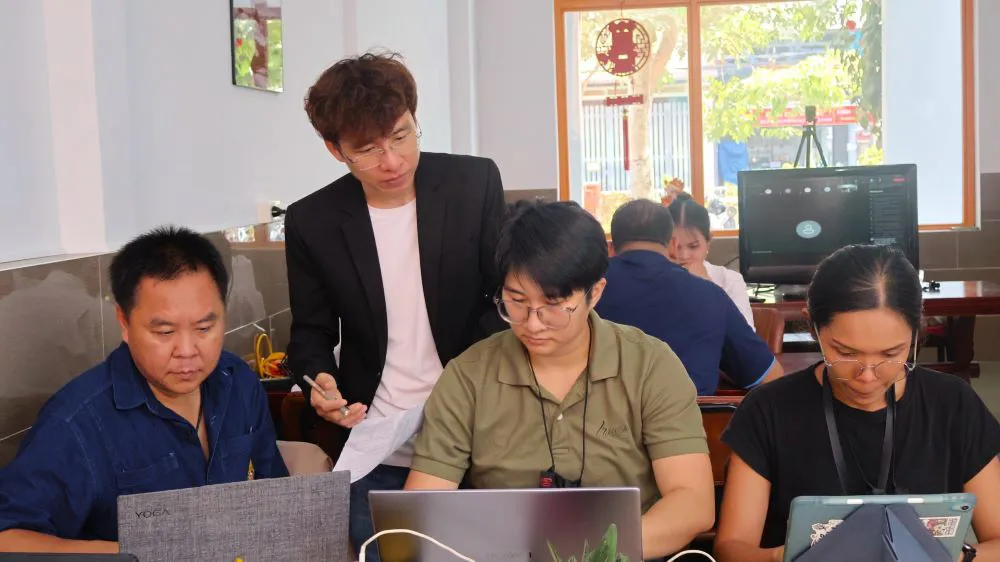
.jpg)

